Question Hi Labman. I have a five month old male westie puppy who is still making pee mistakes in the house even if the door to the garden is wide open for him! He even came in from the garden the other day and stood in front of me and peed! He also will pee if i go out of the house and leave him even if other family members are with him! Am i expecting too much of him? He was five months old on 04/05/06. When should i get a good run of days with no mistakes? I do have a training crate which he sleeps in during the night but not through the day.Many Thanks, Angela
AnswerLikely you are sick of visiting the vet. In any of your visits did you ever mention it? Even if you didn't, the vet should have caught something like a bladder infection.
Likely the problem is either you didn't do housebreaking right, or he is doing it deliberately because you have not established yourself as top dog. Much of the dog advice around is very poor. Doing housebreaking right lays a foundation for obedience training and a good pack sturcture. The dogs see all the people and dogs in the household as a pack with each having their own rank in the pack and a top dog. Life is much easier if the 2 legged pack members
outrank the 4 legged ones. You can learn to play the role of top dog by
reading some books or going to a good obedience class. A good obedience class
or book is about you being top dog, not about rewarding standard commands with
a treat. Start at http://www.dogsbestfriend.com/
Likely you didn't have effective instructions on how to do housebreaking. You need to start over modifying my instructions to fit his current bladder and bowel capacity.
Housebreaking starts before you get home with the new puppy. If you don't have
a crate, buy one. I prefer the more enclosed, den like plastic ones. Skip the
bedding. At first it gets wet, and later it can be chewed into choking
hazards. A wire rack in the bottom will help keep the puppy up out of
accidents at first. They are available with the crates, but a piece of closely
spaced wire closet shelving from a home supply place is cheaper. If you
already have a metal crate, covering it may help. Just make sure you use
something the puppy can't pull in and chew. Dogs that start out in crates as
little puppies, accept them very well. Never leave an unattended puppy loose
in the house. If nobody can watch it, put it in the crate. I suggest letting
the dog have its crate all its life.
Choose a command and spot you want it to use. The less accessible to strays,
the less chance of serious disease. If it is a female, choosing a
non grassy spot will avoid brown spots later. When you bring it home, take it
to the spot and give it the command in a firm, but friendly voice. Keep
repeating the command and let the puppy sniff around. If it does anything,
praise it. Really let it know what a good dog it is and how much you love it,
and maybe a treat. Note, being out there not only means you can praise it,
but it also keeps it from being snatched by a hawk. If it doesn't go, take it
inside and give it a drink and any meals scheduled. A young puppy will need to
go out immediately afterward. Go to the spot and follow the above routine.
Praising it if it goes is extremely important. If it doesn't go, take it back
inside and put it in its crate and try again soon. Do not let it loose in the
house until it does go.
At first it is your responsibility to know and take the puppy out when it
needs to go. It needs to go out the first thing in the morning, after eating,
drinking, and sleeping. If it quits playing, and starts running around
sniffing, it is looking for a place to go. Take it out quickly. You will just
have to be what I call puppy broke until it is a little older.
By the time most dogs are about 3 months old, they have figured out that if
they go to the door and stand, you will let them out. The praise slowly shifts
to going to the door. Some people hang a bell there for the dog to paw. If
your dog doesn't figure this out, try praising it and putting it out if it
even gets near the door. A stern "Bad dog!" is all the punishment that is
effective, and only when you catch it in the act and are sure you didn't miss
it going to the door. Clean up accidents promptly. I mostly keep the little
puppies out of the carpeted rooms. Still I need the can of carpet foam
sometimes. First blot up all the urine you can with a dry towel. Keep moving
it and stepping on it until a fresh area stays dry. A couple big putty knives
work well on bowel movements. Just slide one under it while holding it with
the other. This gets it up with a minimum of pushing it down into the carpet.
This works with even relatively soft ones, vomit, dirt from over turned house
plants, or anything else from solids to thick liquids. Finish up with a good
shot of carpet foam. Note, do not let the puppy lick up the carpet foam.
Once the dog is reliably housebroken, your carpet may need a good steam cleaning.
Many people strongly strongly push cleaning up all evidence of past accidents. I am slower to suggest that. Dogs will return to the same spot if they can find it. When you see one sniffing the spot, that is your clue to run it out.

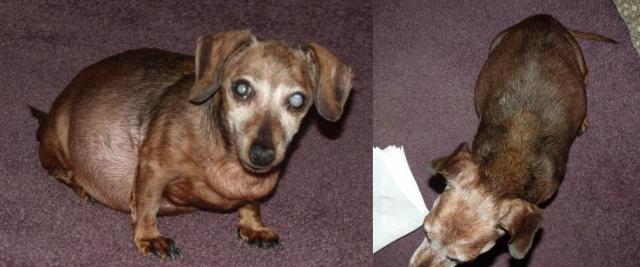 Older dog with distended stomach.
Question
Belle
Hi, my 14 year old miniature dachshund,
Older dog with distended stomach.
Question
Belle
Hi, my 14 year old miniature dachshund,
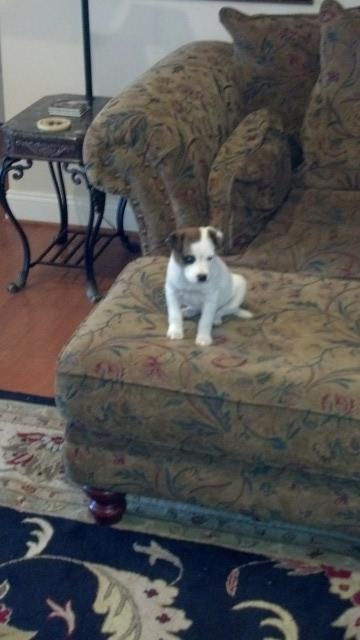 new puppy
Question
bella
I adopted a puppy from the humane
new puppy
Question
bella
I adopted a puppy from the humane
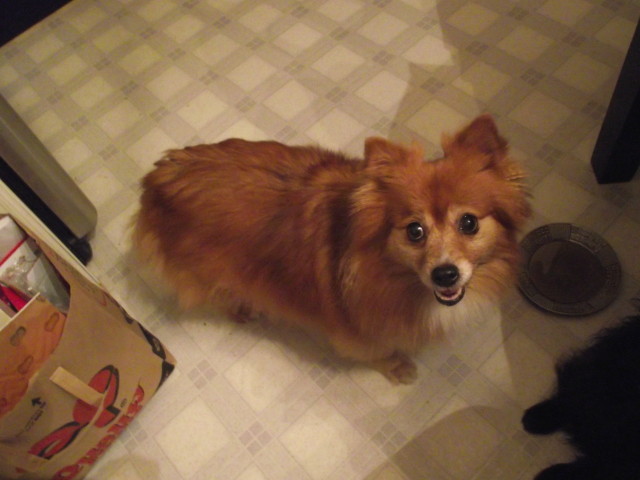 Pomeranian or Pomeranian mix
Question
Brandy my Pomeranian
Hi I have a Dog na
Pomeranian or Pomeranian mix
Question
Brandy my Pomeranian
Hi I have a Dog na
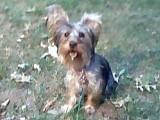 3yr. old Yorkie with ? OCD behavior
Question
Keelee
We live in S.Central WI & with the chan
3yr. old Yorkie with ? OCD behavior
Question
Keelee
We live in S.Central WI & with the chan
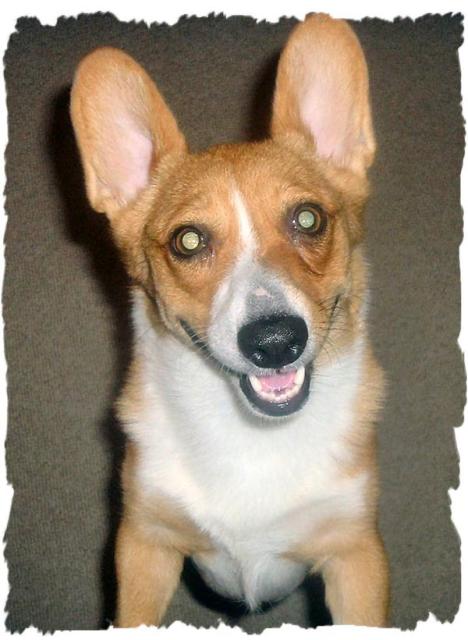 my 3 year old welsh corgi
Question
Bella
I have 2 old cairn terriers, 12 and 15 (
my 3 year old welsh corgi
Question
Bella
I have 2 old cairn terriers, 12 and 15 (